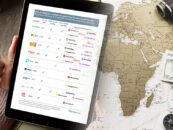Though still in early stage, the Middle East’s fintech sector is rapidly growing, fueled by a young demographic eager to adopt new digital solutions, low penetration of formal banking channels, and the region’s governments push for fintech adoption, says a new report by Indian fintech consulting firm The Digital Fifth.
The report, titled Digital Evolution in Middle East, gives an overview of the Middle East’s fintech sector, highlighting the key drivers of growth across the region as well as pointing out the challenges local startups in the space are facing.
According to the report, the growth of the region’s fintech sector has been largely driven by the payments segment, with top areas that include online payments, bill payments, digital wallets and money transfers. The segment is represented by startups like NymCard from Lebanon, PayTabs from Saudi Arabia, and Vapulus from Egypt.
Digital lending is an emerging segment that has just gotten started across areas like community lending, crowdfunding and loan comparison platforms. The sector is rapidly evolving on the back of a massive small and medium-sized enterprise (SME) funding gap of US$240 billion, the report says. Notable startups operating in the space include Beehive, Souqalmal.com and Eureeca from the United Arab Emirates (UAE), as well as Liwwa from Jordan.
Sectors like insurtech and wealthtech are still nascent though are poised for strong growth, the report says.
Talent shortage, access to funding and rising international competition as top challenges
Despite governments across the region pushing for greater adoption of fintech through favorable rules, regulatory sandboxes and industry initiatives, the sector still faces many challenges, including talent shortage, an e-commerce industry struggling to take off due to low credit card usage, security concerns and consumer preference for cash-on-delivery, and the difficulty in accessing funding.
A Deloitte study released in June 2020 found that data security was amongst the top concerns for consumers when it comes to using fintech solutions, with 40% stating they were worried about the security of their personal data.

Popular fintech solutions/features according to banking customers in the Middle East, Source: Deloitte survey March 2020
Deloitte also cited regulation as a key challenge, noting that in order for the sector to reach its full potential, regulatory harmonization within each of the countries in the Middle East fintech ecosystem was needed.
Another major drawback local fintech companies must face is rising competition from foreign firms entering the Middle East to tap into the region’s large population of unbanked and high mobile penetration.
Earlier this year, three international fintech startups announced plans to expand to the region: Singapore-based wealthtech startup Kristal.AI, US-based payments startup Baton Systems, and Belgian blockchain startup SettleMint.
A deeper look into local fintech ecosystems
The Digital Fifth report also delves into the fintech ecosystems of countries across the region, including the UAE, Bahrain, Egypt and Saudi Arabia.
In Bahrain, it notes that the country has been looking to expand its role as a leading Islamic finance hub, providing opportunities for those operating in Islamic fintech. Internet penetration stands at an impressive 96% and usage of digital banking has grown 18% year-on-year, setting a favorable climate for fintechs to thrive.
Other encouraging developments include the announcement of a national electronic know-your-customer (eKYC) utility tool for financial services, as well as the establishment of ALGO Bahrain, a consortium of Islamic banks that aims to launch 15 fintech banking platform by 2022.
In the UAE, the report notes a booming e-commerce sector that’s been growing at an annual rate of 33% and relatively high adoption of mobile money which currently stands at 25%.
Fintech growth in the UAE has been largely driven by strong government focus on fintech development, notably in free zones like the Dubai International Financial Center (DIFC) and the Abu Dhabi Global Market. The UAE is also home to top accelerator programs such as DIFC Fintech Hive, and government-driven funding programs like the US$100 million DIFC Fintech Fund have attracted their fair share of local and international talents.
The UAE currently hosts a third of all fintech startups in the Middle East, with payments and lending being its two biggest segments.
In Jordan, though fintech is still in its infancy, it is growing on the back of initiatives from the Central Bank of Jordan (CBJ), including the Fintech Regulatory Sandbox and the DFS Council, which was established in 2016 to promote digital finance. The CBJ has also been working to integrate fintech into governmental services and the banking sector, and has partnered with fintech companies to launch innovative products.
The central bank is currently working on an eKYC system that would be linked to a biometric signature, and industry initiatives such as the Startupbootcamp Pride Fintech Cairo program is providing young startups with access to mentorship and exposure to investors.








No Comments so far
Jump into a conversationNo Comments Yet!
You can be the one to start a conversation.